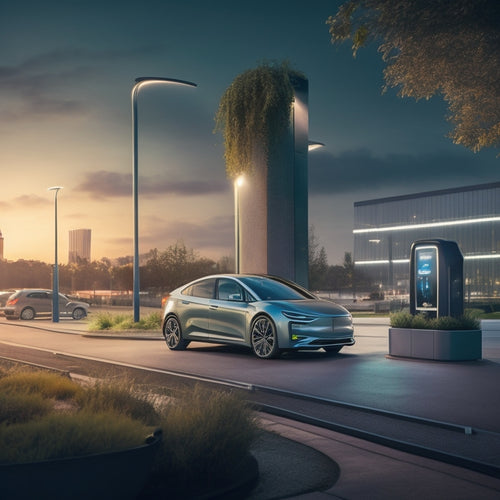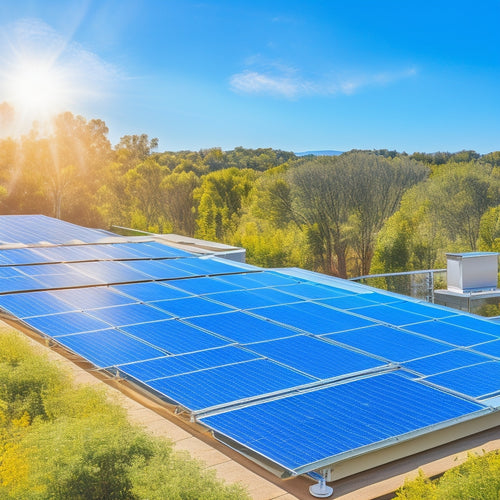
Solar Panel for a House Price
Share
You're likely considering installing solar panels on your house, and a key factor in your decision is the upfront cost, which can range from $15,000 to $30,000 or more, depending on the system size, quality, and installation requirements. However, don't let the initial investment deter you - solar panels can save you an average of $500 annually on energy bills, and with rising energy prices, your long-term savings could reach $12,500 over 25 years. Plus, with high-efficiency cells and a durable 25-year warranty, you can trust your system will perform at its best for years to come. Now, investigate the details that will help you make an informed decision.
The Essentials
- Average cost of solar panels for a house ranges from $15,000 to $30,000, depending on system size and quality.
- High-efficiency solar cells can increase overall power output, but also come with higher upfront costs.
- Long-term savings on energy bills can offset initial investment costs, with potential savings of $12,500 over 25 years.
- Financing options and government incentives, such as tax credits and rebates, can help manage upfront costs.
- Evaluating return on investment is crucial, considering both initial costs and long-term savings on energy bills.
Reduce Carbon Footprint Now
You're likely aware that your daily habits contribute to the growing carbon footprint, but you can make a change today.
By investing in solar panels for your house, you'll greatly reduce your reliance on fossil fuels and lower your emissions.
With Renewable Energy Solutions, you can break free from reliance on the grid and reduce your electricity bills.
As you go green, you'll not only help save our planet but also reap the benefits of renewable energy and potential long-term cost savings.
Go Green Today
Every hour, the world generates 712,000 tons of carbon dioxide, accelerating climate change and environmental degradation.
You can be part of the solution by going green today. Installing solar panels on your house is a significant step towards reducing your carbon footprint.
With the rising cost of traditional energy sources, renewable energy solutions can help you save money on your electricity bills while contributing to a cleaner environment.
Not only do you contribute to a cleaner environment, but you also benefit from solar incentives. The government offers tax credits and rebates to homeowners who invest in solar energy, making it a cost-effective option.
Save Our Planet
By adopting renewable energy sources, such as solar power, carbon emissions are slashed, and the planet's delicate ecosystem is protected from further harm.
You're not only reducing your reliance on fossil fuels but also contributing to a cleaner environment. The environmental impact of traditional energy sources is staggering, with greenhouse gas emissions being a major contributor to climate change.
By switching to sustainable energy solutions like Renewable Energy Bundles, you can reduce your reliance on the grid and lower your energy bills. Furthermore, with extensive packages like Solar Panel and Battery Packages, you can guarantee a reliable and renewable source of energy and stay connected during power outages.
By switching to sustainable energy, you're doing your part to mitigate this issue. Solar panels for your house can greatly reduce your carbon footprint, allowing you to live more eco-friendly.
You'll be generating clean energy and reducing your reliance on the grid. This not only benefits the planet but also saves you money on your energy bills.
As you consider solar panel prices for your house, remember the long-term benefits. You're investing in a cleaner future, where the air is fresh, and the planet is thriving.
Saves You Money Fast
You'll see a considerable reduction in your energy bills when you switch to solar power, as you'll be generating your own electricity instead of relying on the grid.
Residential solar power systems for homes, which employ efficient and durable house solar panels, can provide a reliable source of renewable energy.
Photovoltaic cells convert sunlight into electricity, making it a clean and eco-friendly option.
This means you'll be saving money fast, as the cost of solar energy is considerably lower than traditional fossil fuels.
Cut Energy Bills
Installing solar panels can greatly reduce your energy bills, saving you money fast. This is because solar panels generate electricity locally, reducing your reliance on the grid and the amount you pay for electricity.
By utilizing the power of the sun, you can cut your energy bills considerably, freeing up more of your hard-earned cash for other important things.
When conducting a cost analysis, it's crucial to evaluate the energy savings you'll enjoy with solar panels. On average, homeowners who install solar panels can save up to $500 per year on their energy bills.
Over the system's 25-year lifespan, that's a total savings of $12,500. Additionally, as energy prices continue to rise, your energy savings will increase, providing a hedge against inflation.
Reduce Carbon Footprint
Your decision to go solar not only benefits your wallet but also the environment. By utilizing renewable energy, you're reducing your reliance on fossil fuels and decreasing your carbon footprint. This eco-friendly choice is a vital step towards sustainable living, and it's more accessible than ever.
Here's a breakdown of the environmental impact of solar panels:
| Category | Solar Panel Emissions | Fossil Fuel Emissions |
|---|---|---|
| CO2 Emissions (kg/year) | 15-20 | 4,500-6,000 |
| Water Pollution (gal/year) | 0 | 600-1,200 |
| Land Use (sq. ft.) | 200-400 | 10,000-20,000 |
| Waste Generation (tons/year) | 0.01-0.1 | 10-20 |
| Noise Pollution (dB) | 20-30 | 50-60 |
As you can see, solar panels have a markedly lower environmental impact compared to traditional fossil fuels. By choosing solar, you're not only reducing your carbon footprint but also contributing to a cleaner, healthier environment for future generations.
High-Efficiency Cells Boost Power
You'll want to take into account high-efficiency cells when selecting solar panels for your house, as they greatly impact your system's overall power output.
High-efficiency solar panels, such as those with Silicon Photovoltaic cells, are designed to provide ideal power output renewable energy systems and minimize electricity bills.
Cell efficiency matters because it determines how much electricity each panel can produce per hour of sunlight.
With high-efficiency cells, you can expect a maximum power output, even in areas with limited sunlight.
Cell Efficiency Matters
Since solar panels convert sunlight into electricity, their power output largely depends on the efficiency of their photovoltaic cells.
You'll find that high-efficiency cells are more expensive, but they generate more power per unit area, making them ideal for homes with limited roof space.
When choosing solar panels, you'll come across different cell types, each with its own efficiency rate.
Monocrystalline silicon cells, for instance, have an efficiency rate of around 20%, while polycrystalline silicon cells have an efficiency rate of around 15-17%.
Thin-film cells, on the other hand, have an efficiency rate of around 7-14%.
While high-efficiency cells may increase your upfront installation costs, they can provide more power and potentially reduce your energy bills in the long run.
It's crucial to weigh the pros and cons of each cell type and consider your energy needs, budget, and available space before making a decision.
Maximum Power Output
High-efficiency solar cells, such as monocrystalline silicon, can considerably enhance the maximum power output of your solar panel system.
These cells boast higher output efficiency, which directly translates to more electricity generated per hour of sunlight. When you opt for high-efficiency cells, you can expect a higher power rating for your solar panel system. This means you'll get more power from the same surface area, making the most of your roof's available space.
To put this into context, a high-efficiency solar panel system with a power rating of 300 watts can produce up to 450 kilowatt-hours (kWh) of electricity per month.
In contrast, a lower-efficiency system with a power rating of 250 watts might only produce around 350 kWh per month. That's a significant difference, especially if you're looking to maximize your energy independence and reduce your reliance on the grid.
Assess Your Roof's Shading
When evaluating your roof's suitability for solar panels, you'll need to identify obstructions that can cast shade on your panels.
Take into account trees, vents, skylights, and chimneys that could block sunlight, as well as shading patterns that change over time due to seasonal changes or neighboring buildings.
Additionally, it's crucial to reflect on the overall energy efficiency of your home, including alternative power solutions and energy storage systems, to maximize the benefits of your solar panel installation.
Roof Obstructions to Consider
Roof obstructions, such as skylights, vents, and chimneys, can greatly impact the performance of your solar panel system. These obstructions can cast shadows, reducing the energy output of your panels.
When evaluating your roof's shading, it's important to take into account these installation obstacles. You'll want to assess your roof's orientation, taking note of any south-facing slopes that receive direct sunlight.
Additionally, take into account the placement of obstructions in relation to your solar panel array. For instance, if you have a large skylight or chimney in the center of your roof, it may be more challenging to install a solar panel system that can generate sufficient energy.
You may need to adjust the placement or size of your solar panel system to accommodate these obstructions. By carefully evaluating these factors, you can optimize your solar panel system's performance and guarantee you're getting the most out of your investment.
Shading Patterns Over Time
Your solar panel system's performance is heavily influenced by the shading patterns on your roof, which can vary greatly over time. As a homeowner, it's important to grasp how these patterns impact your system's energy production. A shading analysis is vital to identify areas of your roof that receive partial or full shade, which can greatly reduce energy output.
Seasonal variations also play a major role in shading patterns. During winter, the sun is lower in the sky, resulting in longer shadows and increased shading. In contrast, summer months bring longer days and higher sun angles, reducing shading.
You'll need to take into account these changes when evaluating your roof's shading. Overhanging tree branches, neighboring buildings, and roof obstructions can all contribute to shading patterns.
Durable 25-Year Warranty Backing
You expect your solar panels to perform reliably over the long haul, and a 25-year warranty backs that promise.
This warranty guarantees the panels will maintain a certain level of energy production, ensuring you get the most out of your investment.
With a reliable performance promise, you can have confidence in your system's ability to generate clean energy for years to come.
Reliable Performance Promise
Investing in solar panels comes with a significant upfront cost, but manufacturers back their products with a durable 25-year warranty, promising reliable performance and mitigating potential risks. You can rest guaranteed that your solar panel system will deliver consistent energy reliability, meeting your performance metrics expectations.
The warranty covers both the equipment and the performance of the solar panels. This means that if your system's energy output falls below a certain threshold, the manufacturer will replace or repair the necessary components to guarantee peak energy production. This promise of reliable performance gives you the freedom to enjoy the benefits of solar energy without worrying about the system's durability.
With a 25-year warranty, you can expect your solar panel system to provide a stable source of energy for decades to come. This long-term commitment from manufacturers provides you with the confidence to invest in a solar panel system, knowing that it will continue to meet your energy needs for years to come.
Frequently Asked Questions
How Long Does It Take to Install Solar Panels on a House?
You'll find that the installation timeline varies depending on solar panel types and your house's complexity, but on average, a professional team takes 3-5 days to complete the job, with permitting and inspections adding a few weeks to the process.
Can I Install Solar Panels Myself to Save Money?
Did you know 72% of homeowners consider DIY projects a way to assert independence? When it comes to solar panels, you can save up to 50% on installation costs by doing it yourself, but be prepared for a complex, time-consuming DIY installation process.
Are Solar Panels Affected by Weather Conditions Like Hail?
You're right to wonder if weather conditions like hail affect solar panels; fortunately, most modern panels are designed to withstand hail damage, boasting impressive weather durability, so you can capture the sun's energy with confidence, come rain or shine.
Do Solar Panels Require Regular Cleaning and Maintenance?
You'll be surprised to know that dirty solar panels can lose up to 25% of their efficiency! To maximize their 25-year lifespan, you'll need to clean them every 6-12 months, depending on your location, to guarantee ideal energy production.
Can Solar Panels Be Used for Heating Water and a Pool?
You can utilize solar energy to heat water and your pool using solar water heaters and pool heating systems, which work independently of your home's electrical system, offering you a sustainable and cost-effective way to enjoy warm water and a warm pool.
Final Thoughts
As you utilize the power of the sun, your carbon footprint shrinks, and your wallet grows. With high-efficiency cells, your solar panel system becomes a money-making machine. Assess your roof's shading, and let the durable 25-year warranty be your shield against uncertainty. Now, take the first step towards a cleaner, greener tomorrow. The future is bright, and so is your financial horizon - invest in a solar panel for your house today.
Related Posts
-

Solid State Batteries in Electric Vehicles
Solid-state batteries revolutionize electric vehicles by offering a longer lifespan and higher energy density than tr...
-

What Types of Solar Energy Devices Are Available
You'll find several types of solar energy devices available today, each customized to different energy needs. Photovo...
-

Essential Hiking Lights for Safety and Fun
When you're hitting the trails, essential hiking lights are vital for safety and fun. A lightweight headlamp offers h...


